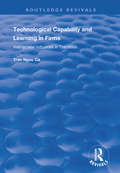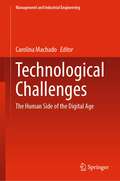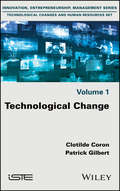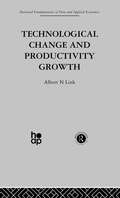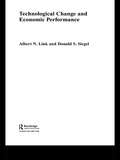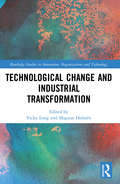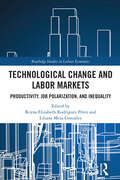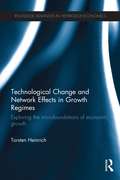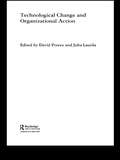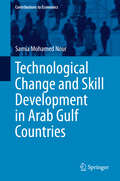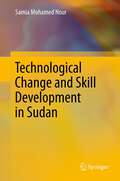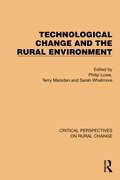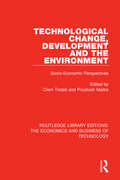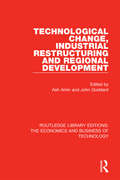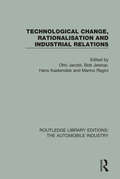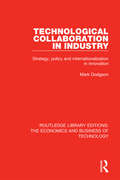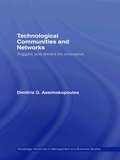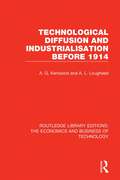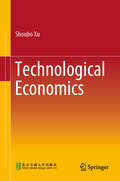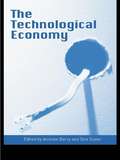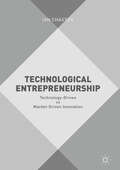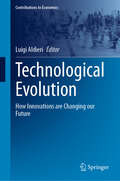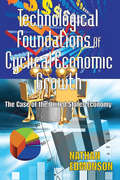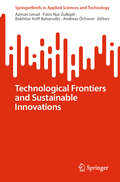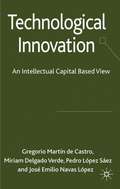- Table View
- List View
Technological Capability and Learning in Firms: Vietnamese Industries in Transition (Routledge Revivals)
by Tran Ngoc CaFirst published in 1999, this volume examines technology in developing countries with a focus on Vietnam. One of the world’s poorest countries, Vietnam has begun rehabilitation following the Vietnam War. Tran Ngoc Ca had four aims for this study. First, exploration of the development of TC in Vietnamese industrial companies and looks at how the learning process is related to the accumulation of TC. Second to detail links between macro environment factors and micro internal actions of firms and their impact on TC. Third, addressing specific issues in comparison with other developing countries and transitional economies. Fourth and finally, to provide a background for the implementation of policy concerned with enhancing TC acquisition.
Technological Challenges: The Human Side of the Digital Age (Management and Industrial Engineering)
by Carolina MachadoThis book discusses and exchanges information on principles, strategies, models, techniques, methodologies and applications of technological challenges in a digital era. It helps the reader to develop the skills required in the digital age and to acquire the knowledge and know-how necessary to drive their organizations to success. This book presents contributions that are exceptional in terms of theory and/or practice in the area of human resources management, technological management, digital age, creativity, technological innovation, organizational innovation, business analytics and flexibility.
Technological Change
by Clotilde Coron Patrick GibertTechnological change is exciting as much as it is daunting. The arrival of new digital tools affects consumption patterns, types of employment and working conditions, and can pose challenges to organizations and individuals alike. Indeed, although technological change is a factor for economic growth, it can also be an amplifier, or even a catalyst, of inequality. It is also a social change and interacts in complex ways: technology is both the source and the consequence of social transformation. To understand technological change and to harness its effects, this book studies transformations at different levels (societal, organizational and individual). In its analysis of the subject, it also draws on a number of disciplines of the human and social sciences, such as anthropology, sociology and psychology.
Technological Change & Productivity Growth (Fundamentals Of Pure And Applied Economics Ser. #Vol. 1)
by A. LinkThis volume reviews the literature on productivity growth and relates it to the production function approach to technological change.
Technological Change and Economic Performance (Routledge Studies In Global Competition Ser. #Vol. 17)
by Albert N. Link Donald SiegelThis useful new book reviews the literature on technology and economic growth covering historical and theoretical developments such as: *new models for measuring productivity*sources of technical knowledge and technological spillovers*stock market reactions to investment in technologySuch a comprehensive survey is likely to be welcomed by students
Technological Change and Industrial Transformation (Routledge Studies in Innovation, Organizations and Technology)
by Vicky Long and Magnus HolménIndustrial transformation is a research and teaching field with a focus on the phenomenon and mechanisms of industrial development and renewal. It concerns changes in economic activities caused by innovation, competition and collaboration, and has a rich heritage of evolutionary economics, institutional economics, industrial dynamics, technology history and innovation studies. It borrows concepts and models from the social sciences (sociology, history, political sciences, business/management, economics, behavioural sciences) and from technology and engineering studies also. In this book, the authors present the key theories, frameworks and concepts of industrial transformation and use empirical cases to describe and explain the causes, processes and outcomes of transformation in the context of digitalisation and sustainability. They stress that industrial transformation consists both of Darwinian "survival of the fittest" selection, and of intentional pursuits of innovation and of industrial capabilities creation. The work argues that managing the global trends of transformation is not only about new technology and innovation; existing institutional settings, as well as dynamic interactions between technological change, organisational adaptation and economic activities, also have a profound impact on future trajectories. The areas under investigation are of great relevance for strategic management decisions and for industrial and technology policies, and for understanding the mechanisms underlying transformation and sustainable growth.
Technological Change and Labor Markets: Productivity, Job Polarization, and Inequality (Routledge Studies in Labour Economics)
by Liliana Meza González Reyna Elizabeth Rodríguez PérezIn developed countries like the US, Germany and the UK it has been observed that workers who perform non-routine activities, either cognitive or manual, have benefited in terms of employment and income, while those performing routinary tasks have seen their job prospects and wages decline. This has led to a polarization of the labor markets and to a decrease in certain measures of inequality. This phenomenon has been attributed to task-biased technological change (TBTC), which differs from the skilled biased technological change in the fact that not only highly skilled workers have benefited from technology advancement. This book presents evidence of how digitalization and task-biased technological change are affecting the labor markets of different regions of the world and examines the factors that cause this inequality among nations.It examines recent issues around the effect of task-biased technological change on labor markets and the economy in general, with a comparison of different countries in Central and Eastern Europe, North America, and Latin America, as well as in other regions of the world. The incorporation of the abovementioned regions presents relevant particularities for the subject matter addressed in the book. The book also considers questions such as how labor market effects differ by gender and what the impact of digital skills on employment, inequalities and public policies might be. In so doing, it identifies the advances, opportunities, and changes that have taken place, while also making public policy proposals.The main market for the book is the global community of graduate students and researchers in the field of economics and, specifically, in the study of labor markets.
Technological Change and Network Effects in Growth Regimes: Exploring the Microfoundations of Economic Growth (Routledge Advances in Heterodox Economics #17)
by Torsten HeinrichIn this new volume it is argued that network effects are much more common than usually assumed, and that they have a profound impact on many aspects of economic systems, especially technological change and economic growth. The analysis and modelling of this interrelationship is the central focus of this book. While there exists a vast body of literature on economic growth, the theories put forward so far have had limited success in explaining observed patterns of economic growth. ‘Growth cycles’ in particular continue to elude standard economic models, though evolutionary economics has made some progress. Seeking to fill the gap, Torsten Heinrich’s innovative approach uses microeconomics to explain heterogeneous sectoral dynamics on the meso level, and then aggregating these to observed macroeconomic growth rates. In this way, it is shown that an evolutionary model of technological change with network effects can explain not only commonly observed asymmetric industry structures, monopolies and oligopolies but also ‘growth cycles’. The book includes a comprehensive account of the most influential economic growth theories, a discussion of the research on network effects as well as an introduction to the methodology, the model, and a case study on the recent emergence of information and communication technology. This important new volume will be relevant to all those interested in theoretical economics, growth theory, innovation economics, agent based modelling and industry dynamics.
Technological Change and Organizational Action (Routledge Studies in Technology, Work and Organizations #Vol. 2)
by David Preece Juha LaurilaIn recent decades an extensive array of changes and innovations have taken place in and across work organizations and networks of organizations and workers, facilitated by new technologies and technological forms. This has initiated an interest in technological change as one of the conditions for organizational action and researchers have begun to draw inspiration from a wider spectrum of conceptual issues, perspectives and theoretical traditions.This book is interested in the level of praxis and how this might be understood and theorized. It brings together a comprehensive collection of empirically-grounded and theoretically-informed research projects from studies of organizational practice which explore a number of technological changes in a variety of contexts. These are informed by contemporary debates within and across theoretical approaches including the sociology of technology, work and organizations, actor network theory, technology as text and metaphor, processual and political perspectives, social and business network-based approaches to the analysis of technology and innovation, and the social construction and shaping of technology. This book will be essential reading for researchers and advanced students within the field of technology, work and organizations and also organization studies and management studies.
Technological Change and Skill Development in Arab Gulf Countries
by Samia Mohamed NourThis book discusses skill formation, upskilling of workers, and their interaction with technological change in Gulf countries. Heavy dependence on oil, the 'Dutch Disease', and the high incidence of unskilled foreign workers have caused serious structural imbalances in the labour market in the Gulf. The author shows that success of economic development strategies to address such imbalances are all contingent upon the development of adequate and appropriate skills in the region. This book confirms the role and impact of the deficiencies in the educational system alongside the well established effects of the excessive use of uneducated foreign workers and lack of incentives in the labour market. A comprehensive investigation of the skill problem and an elaborate in-depth analysis to assess the causes, consequences and relationships between poor skills and technological performance are highlights of this book. This is an ideal resource for policy makers in the Gulf region and researchers of the topic.
Technological Change and Skill Development in Sudan
by Samia Mohamed NourWith the ongoing restructuring in Sudan, structural issues such as the need for skill development and interaction with technological change need an in-depth analysis that this book offers. The central themes of this book are- required skill formation, upskilling of the workers, and their interaction with technological change in lieu of a deficient educational system and its implications. An empirical investigation of the causes and consequences of low skill and technology indicators using a primary survey at macro and micro levels is undertaken. This is followed by an examination of the interaction between the low skill and technology indicators, the relationships between skill, upskilling and technology indicators, skills mismatch, the uses and impacts of ICT and differences at firm as well as industry level as well as knowledge transfer effects. A set of recommendations towards the need for implementation of consistent policies, increasing incentives and collaboration between public and private institutions completes the book.
Technological Change and the Rural Environment (Critical Perspectives on Rural Change #2)
by Sarah Whatmore Philip Lowe Terry MarsdenOriginally published in 1990, this volume addresses issues surrounding global ecological changes and sustainability of present patterns of urbanisation and industrialisation. The book discusses these problems and other issues such as how rural environments in many developed and developing countries have been transformed by a technological revolution. Looking at a diverse range of topics from climate change to slurry pollution and the destruction of genetic resources to the risks of biotechnology, this volume addresses these issues which concern the dynamics and social relations of technological change in rural areas.
Technological Change, Development and the Environment: Socio-Economic Perspectives (Routledge Library Editions: The Economics and Business of Technology #49)
by Clem Tisdell Priyatosh MaitraOriginally published in 1988, this book considers some of the major social, economic and environmental questions raised by the role of new technology in development. Throughout the discussions of issues like the sustainability of the development effected by new technology is supported by detailed case studies from countries such as India, Australia, New Zealand, China, Bangladesh and South Africa.
Technological Change, Industrial Restructuring and Regional Development (Routledge Library Editions: The Economics and Business of Technology #1)
by Ash Amin and John GoddardOriginally published in 1986, this book was published at a time when the manufacturing structure of advanced economies was transformed. The growing internationalization of production, the rising power of giant corporations and the increasing rate of technological innovation remain key issues today. The impact of these changes is felt unevenly between regions, shown by huge job losses in some places and high-tech based growth in others. Drawing together contributions from economists, geographers, sociologists and management specialists, the problems facing the declining regions are discussed and analyzed. The book will be of interest to researchers, planners and policymakers concerned with the regional aspects of technological change and industrial restructuring.
Technological Change, Rationalisation and Industrial Relations (Routledge Library Editions: The Automobile Industry)
by Edited by Otto Jacobi, Bob Jessop, Hans Kastendiek and Marino ReginiOriginally published in 1986 the first part of this book outlines some of the general problems of technological change and labour relations. It discusses the politics of rationalisation and of industrialisation in the car industry by examining case studies of Volkswagen British Leyland and FIAT. The impact developments exert on trade unions in the UK, Germany and Italy is discussed simultaneously.
Technological Collaboration in Industry: Strategy, Policy and Internationalization in Innovation (Routledge Library Editions: The Economics and Business of Technology #11)
by Mark DodgsonThis volume, originally published in 1993 is based on extensive research and draws together a selection of detailed global case studies illustrating a variety of issues from Japanese joint ventures to small business development. It considers the scope and scale of collaboration in order to assess the way successful companies have achieved their growth. The book presents a synthesis of business functions and economic analysis and asks what the implications for skills development are; what effect public policy has; how far such ventures can go and what decision making processes are involved.
Technological Communities and Networks: Triggers and Drivers for Innovation (Routledge Studies In Technology, Work And Organizations Ser. #Vol. 32)
by Dimitris AssimakopoulosThe first book to analyze how new technologies are emerging against a background of continuing globalization of research and development activities. This unique book explores how technological communities and networks shape a broad range of new computer based technologies in regional, national and international contexts.Offering a critique of exist
Technological Diffusion and Industrialisation Before 1914 (Routledge Library Editions: The Economics and Business of Technology #24)
by A. G. Kenwood A. L. LougheedPublished in 1982 this is an introductory study of the international spread of modern industrial technology. The book considers the preconditions necessary for a country to adopt effectively modern industrial technology in the nineteenth century and the mechanisms by which this technology spread from one country to another. A global view is adopted and thus the book supplements others which are concerned with the industrial developmet of individual countries during the same period. It will be invaluable to anyone seeking an understanding of the early history of capitalism.
Technological Economics (Advances In Systems Science And Engineering (asse) Ser.)
by Shoubo XuThis book creatively puts forward the subject nature, object, system, theory, method and application of technical economics, and brings together the research achievements of 50 years, especially the latest research results. It is of great significance for the development of China's technical and economic disciplines and the cultivation of special talents for technical and economic development. It is of great significance for the solution of major technical and economic problems in economic and social development, and has a landmark significance in the history of world technical economics. The book can be used as teaching material for both the liberal arts, science and engineering students within higher education institutions, and as a leading cadre training source for engineers. Furthermore, it can facilitate readers engaged in policy making, program planning, macro control, evaluation of investment decision, feasibility studies, project with aspects such as government, consulting companies, banks, and financial personnel needs. Also this book can aid readers with engineering design, product development, business management, as well as with the needs of engineering and technical personnel and enterprise management personnel.
Technological Economy
by Don Slater Andrew BarryIn this major new collection, leading experts explore the multidisciplinary connections between technology and economy, drawing on new convergences between economic sociology and science and technology studies. Through theoretical and empirical studies, the authors investigate: * economics and economic knowledges as technologies* the economies as socio-technical arrangements* the nature of innovation* the role of technological mediations in representing and performing economies. This revealing book, ideal for those with an interest in contemporary social theory, interrogates the evidence for the contemporary claims about the emergence of the ‘new economy’ and ‘knowledge-based economies’ and sheds new light on the relationship between economy and culture.
Technological Entrepreneurship
by Ian ChastonThis comprehensive book responds to the growing demand to study entrepreneurship as a key driver of innovation and competitive advantage. Challenging the existing idea that technological entrepreneurship exists predominantly in SMEs and as a result of market demands, the author argues that a commitment to entrepreneurship remains the most effective strategy for sustaining wealth generation for both organisations and entire nations. The aim of Technological Entrepreneurship is to provide the reader with additional knowledge and understanding of the concepts associated with the exploitation of technological entrepreneurship, and to demonstrate how associated management principles are somewhat different to those utilised in market-driven entrepreneurship. Validation of presented theoretical concepts is achieved through coverage of processes and practices utilised by real world organisations seeking to achieve maximum wealth generation, with specific emphasis on how technological entrepreneurship is the source of disruptive innovation within service sector organisations and how the philosophy is causing fundamental change in the provision of healthcare.
Technological Evolution: How Innovations are Changing our Future (Contributions to Economics)
by Luigi AldieriInnovation plays an important role in ensuring the right balance in environmental systems and in ensuring social welfare in different spheres of society. This volume sheds light on innovation processes through the analysis of research and development expenditures (R&D) or patent data. In particular, the chapters further explore the innovation process of firms, the relative impact of employment, and the interactions with environmental issues.The book further examines the role of technological innovation in the energy and agricultural sectors from an environmental point of view, discussing how it ensures significant improvements in energy efficiency, sustainable resource management, and recycling. Additionally, the central role of technological innovation in social welfare is discussed, including new technologies that can improve access to education, health, and employment.The book features theoretical and empirical contributions from the fields of economics of innovation and relative public policies and will appeal to students, scholars, and researchers interested in a better understanding of innovation economics, environmental economics, employment effects of digital innovation, liquidity constraints, and productivity.
Technological Foundations of Cyclical Economic Growth: The Case of the United States Economy
by Nathan EdmonsonNew technology is intimately associated with increased economic growth. The tools people have and when they acquired them tells us much about cyclical patterns of growth. Those interested in encouraging economic growth would do well to look to the conditions that spur the origins, development, and impact of technology - as well as the circumstances that spur prolific periods of invention, the mother of technology. Despite general recognition of the connection between technology and growth, economists rarely have gotten to the heart of the relationship. Joseph Schumpeter and John Hicks were aware of the role of technology in cyclical variability, but their thoughts were not elaborated upon after they passed from the scene. Edmonson goes beyond formal theory, reviewing the record of economic growth and the role of technology in this growth. What does the technology future hold? One clue is where past prototype inventions that that have fomented massive technological innovations have come from. Some parts of the private sector, such as Bell Labs, have been important. The government, particularly in its sponsorship of defense related research, has delivered a number of inventions. Universities are very much in the picture in certain fields, such as nanotechnology. The challenges we face at the onset of the twenty-first century are covered in depth and with imagination by Edmonson. The book will spur much rethinking about economic futures.
Technological Frontiers and Sustainable Innovations (SpringerBriefs in Applied Sciences and Technology)
by Andreas Öchsner Azman Ismail Fatin Nur Zulkipli Bakhtiar Ariff BaharudinThis book takes a deep dive into the industrial sphere, exploring subjects such as aerospace development, knowledge management in higher education, and the emergence of a nation as a player in the global space race. This insightful compilation of chapters offers an essential guide to navigating the complexities of modern industry, offering valuable insights and solutions to propel businesses and society toward a sustainable future.
Technological Innovation
by Gregorio Martín de Castro Miriam Delgado Verde Pedro López Sáez José Emilio Navas LópezConsidering the uncertain, competitive and dynamic current environment, the capability to create and apply new knowledge represents one of the main sources of sustained competitive advantage (Teece, 1998; Nonaka, 1991; Almeida, Song& Grant, 2002). Intellectual capital stocks, as well as their different manifestations play a critical role for effective development of the firm technological innovation (Teece, 1998; Subramaniam and Youndt, 2005). Wedevelop an improved and extended theoretical and empirical propositions about it can labeled 'An Intellectual Capital Based-View of Technological Innovation'. The book is about the role of knowledge stocks or intellectual capital blocks (human, structural, and relational capital) on two technological innovation processes typologies (process/product). This method obtains evidence-driven models that depict the nature of innovation management, since it is shown the significant and positive influence of each intellectual capital components on product and process innovation. "
